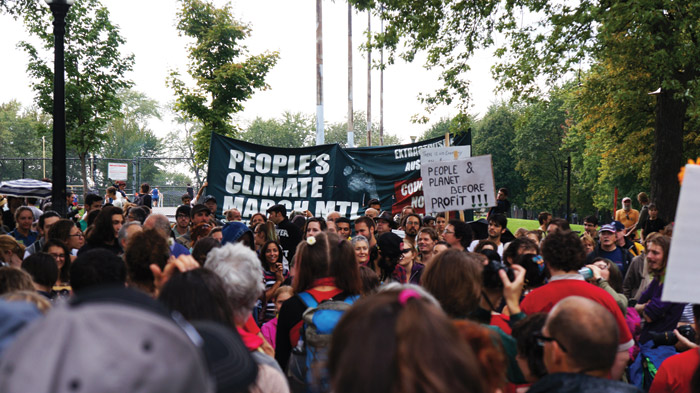A group of Quebec youth are stoking a freshly-lit fire in the fight against global climate change. Montreal climate justice organization ENvironment JEUnesse (ENJEU) is pursuing a class-action lawsuit against the federal government for climate negligence on behalf of all Quebec youth under the age of 35. They argue that young people will disproportionately suffer the harsh consequences of climate change over the century to come. While Canada is a signatory to the Paris Agreement and has set reduction targets for greenhouse gas emissions, ENJEU argues that, not only are these targets not ambitious enough, but that the government is failing to meet even these meagre standards. Their lawsuit takes concerns about the climate that seem too big to tackle, and finds specific and substantive measures to effect meaningful progress toward sustainability.
The Intergovernmental Panel on Climate Change (IPCC) released a report in October warning that only 12 years remain to prevent catastrophic climate change. If we fail to make substantial reductions in emissions and consumption, hundreds of millions of people will face dire consequences, including extreme heat, drought, flooding, and poverty. Despite increasingly-urgent scholarly literature on climate change, global superpowers have remained stagnant in their environmental policies. With the exception of the Paris Agreement, many major countries’ legislative repertoires are void of the determined, large-scale efforts necessary for addressing climate change. Their inaction means that the only path to adequate solutions is through grassroots activism as opposed to self-motivating federal policy.
The lawsuit is the first of its kind in Canada, but not in the world: In 2015, the Urgenda foundation won a landmark climate justice case against the Dutch government. Since then, Juliana v. US, a case awaiting a hearing at the Supreme Court, has argued that the U.S. government is depriving children of a climate capable of sustaining human life. Earlier this year, 12 citizens in the UK brought a similar lawsuit to their country’s high court. Several cities in California have sued monolith oil companies like Shell and BP. In January, New York City revealed a plan to do the same, as well as to divest $5 billion from fossil fuels. Even McGill has modelled citizen-driven divestment policy: Earlier this year, the Senate showed support for divestment from fossil fuels. Their endorsement was driven in large part by public pressure and deliberation from Divest McGill, a campus environmentalist group.
Grassroots climate litigation is precisely the sort of activism that can save our planet. In many ways, this ground level advocacy succeeds where federal and local governments fail. Climate change policy is still extremely difficult to introduce, let alone adhere to. It requires that countries divert from global capitalism, which has spent decades entrenching itself on the false promise of unlimited resources. Environmental policy also lacks immediacy, which is problematic for federal governments. Enacting legislation that may hinder a country’s industrial and economic development in the short-term, and whose benefits might not be seen for a generation, is unappealing to even the most progressive administrations. Finally, the private sector, which ravenously profits from fossil fuels, has extensive influence over powerful governments. Renewable energy is predicted to become cheaper than fossil fuels by 2020; however, its long-term investment is not a reality so long as ExxonMobil, Chevron, and others have their say. It is reasonable to wonder why the Canadian government has exhibited the sort of negligence ENJEU is alleging in light of their pledge to sustainability and its economic incentives. Not surprisingly, the government’s persistently-growing interests in the global oil market and the influence of oil-company lobbyists have something to do with it.
With so many obstacles to legislative movement toward sustainability, young people must take climate justice into their own hands. Lawsuits like ENJEU’s should be a prototype for communal efforts at environmental activism. They allow rational individuals who recognize the realities and magnitude of climate change to hold both the public and the private sector accountable. We are facing a massive anthropogenic issue which begs an equally large, cohesive, and consistent solution.








